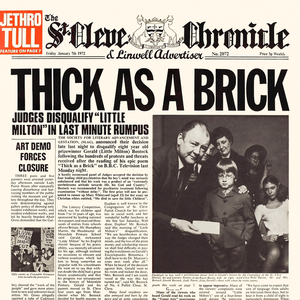Published on Jul 16, 2004
Of the many prog-rock albums that are out there, few of them are
as well-renowned, as unique, or as flat-out good as Jethro Tull’s
1972 follow-up to the wildly successful
Aqualung.
Thick As A Brick is different from most because the entire
thing, clocking in at about 43:36, is just one song. Because of the
success of the aforementioned album,
Thick As A Brick was able to catapult its way to No.1 on the
U.S. charts, solidifying Tull’s position as a rock giant for
several years to come. But beneath its commercial success is an
album lyrically, structurally, and musically complex and
brilliant.
To me, the high point of this album is its opening. A great folk
riff plays in the background to a stunning vocal performance by
Anderson that’s extremely catchy, and will stay stuck in your head
for days.
However, instead of continuing on a folky path, the album
explodes into one that leads the listener down several different
musical paths. At times it can be super-jazzy and lively, at other
times soft and slow, and at others a culmination of the two. Flute
passages permeate the album, making it all that much more
enjoyable, as is Martin Barre’s guitar licks, which, as usual,
never fail to disappoint.
The lyrical imagery of this album is damn near overwhelming. For
example:
“The Poet and the painter casting shadows on the water- as the
sun plays on the infantry returning from the sea- The doer and the
thinker; no allowance for the other- as the failing light
illuminates the mercenary’s creed.”
Along with it go a boatload of vivid symbols and social
commentary, making it quite possibly Tull’s most intricate album to
date.
My only quibble with this album is that it starts to drag around
the 26-minute mark, when some odd little quotes seem to pop up out
of nowhere. Fortunately, it gets back on track shortly after that
to deal out another 17 minutes or so of musical brilliance. The
album ends like most concept albums do, with the beginning being
played again. This symbolizes that things have come full circle,
and to me, they couldn’t have ended the album in a better way.
In all, this would be Tull’s apogee for their writing and
playing skills. While this writer tends to enjoy the more
laid-back, balls-out, hard rocking of
Aqualung, for many prog-rock fans, this disc is their Holy
Grail.
